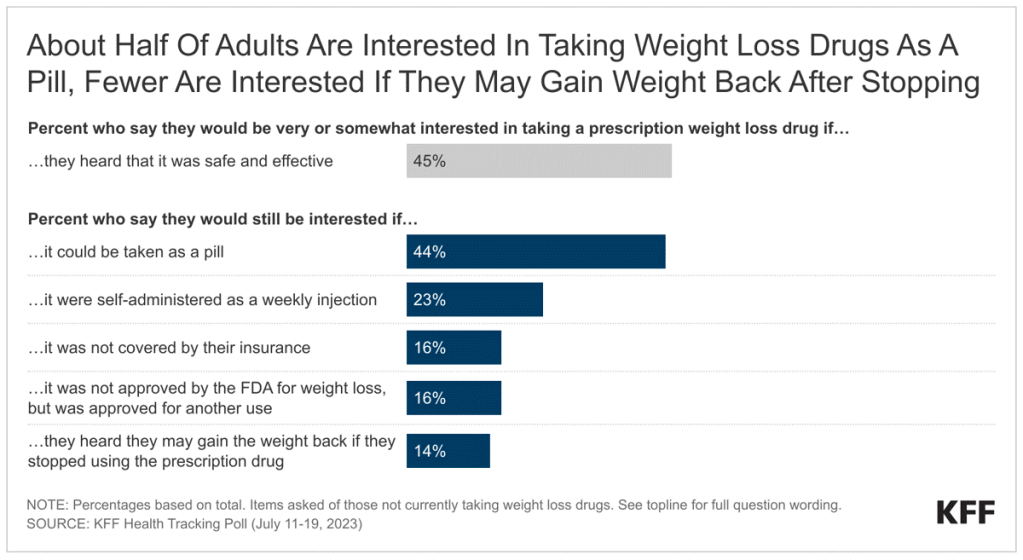[ad_1]
Just about part (45%) of the general public are no less than moderately fascinated with taking a prescription weight-loss drug, together with many that say they just wish to lose a bit of weight, although many of us get bored when offered with attainable monetary and scientific drawbacks, the latest KFF Health Tracking Poll finds.
The ballot gauges the general public’s passion in the use of pharmaceuticals to drop some pounds as a moderately new magnificence of gear, first of all authorized to regard diabetes, is garnering consideration for his or her attainable to assist weight reduction. Amongst the ones seeking to drop some pounds, six in 10 (59%) say they might be fascinated with a protected and efficient weight-loss drug, together with part (51%) of those that say they’re seeking to lose not up to 10 kilos.
Other folks’s passion in attempting such medicine drops considerably when requested about attainable stumbling blocks and disadvantages. As an example, about one in six say they might stay if it weren’t coated through their insurance coverage (16%) or if the U.S. Meals and Drug Management had now not authorized the drug for weight reduction however for a special situation (16%). A an identical proportion (14%) say they might nonetheless have an interest if they could acquire again the burden they misplaced in the event that they stopped taking the drug.

A big majority (80%) of the general public says insurers must quilt the price of weight-loss medicine for adults who’ve been recognized as obese or overweight whilst part of adults (53%) says insurers must quilt the price of those medicine for someone who desires to drop some pounds. Part (50%) say that insurers must quilt the medication’ value despite the fact that it might build up per thirty days insurance coverage premiums for everybody.
Few Acutely aware of Medicare Drug-Worth Provisions Integrated in Remaining 12 months’s Inflation Aid Act
Just about a yr after President Biden signed the Inflation Aid Act into regulation, moderately few persons are acutely aware of its provisions geared toward reducing prescription drug prices in Medicare.
For instance, 1 / 4 of the general public are mindful that there’s a regulation requiring the government to barter some drug costs for folks with Medicare (25%); capping insulin prices for folks with Medicare (25%); and putting an annual prohibit on Medicare enrollees’ out-of-pocket drug prices (24%). Fewer know that there’s a regulation penalizing drug firms that lift Medicare drug costs sooner than the velocity of inflation (10%).
Other folks ages 65 and older, who’re in large part coated through Medicare, are much more likely than more youthful adults to pay attention to some of these provisions, however nonetheless the stocks are modest. As an example, amongst people who find themselves no less than 65 years outdated, 44% know concerning the insulin worth caps and 34% find out about the once a year prohibit on out-of-pocket drug spending.
The ballot additionally gauges the general public’s perspectives about drug producers and drug costs.
Key findings come with:
- About 3 in 10 (28%) adults, together with 40% of the ones with annual family earning beneath $40,000, say it’s tricky for them to come up with the money for pharmaceuticals. A an identical proportion of adults (31%) say that they didn’t take their drugs as prescribed prior to now yr because of their prices.
- About 8 in 10 (83%) adults say drug firms’ income are a significant factor contributing to the cost of pharmaceuticals, together with massive majorities of Republicans (89%), Democrats (84%), and independents (78%). Fewer adults say that analysis and building prices (54%) or advertising and marketing and promoting (45%) are primary components affecting drug costs.
- Just about three-quarters (73%) of the general public say there isn’t sufficient law of prescription drug costs, up from 63% in Would possibly 2021. This comprises two thirds of Republicans (68%), up from 57% in Would possibly 2021.
Designed and analyzed through public opinion researchers at KFF, the survey used to be carried out from July 11-19, 2023, on-line and through phone amongst a nationally consultant pattern of one,327 U.S. adults. Interviews had been carried out in English and in Spanish. The margin of sampling error is plus or minus 3 share issues for the entire pattern. For effects in line with different subgroups, the margin of sampling error could also be upper.
[ad_2]
Source link
